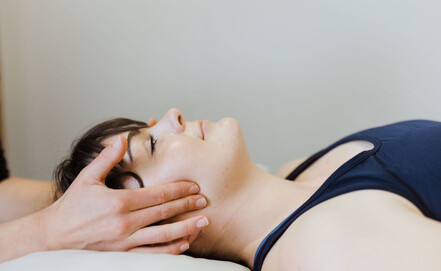TMJ
(Jaw) Pain
The temporomandibular joint (TMJ) acts like a sliding hinge, connecting your jawbone to your skull. When injured, inflamed or irritated, this can cause pain or discomfort.
What are the symptoms of a TMJ condition?
- Limited mouth opening
- Pain in the jaw, mouth and face
- Pain when fully clenching the jaw or chewing hard food
- The jaw getting stuck in an open or closed position
- Ringing in the ear or the ear feeling blocked
- Headaches
- Clicking noises when opening or closing the mouth
Certain factors can make you more at risk of developing TMJ problems, including:
- Prolonged mouth opening i.e. during dental surgery
- Altered posture or sustained neck postures
- Regular nail biting, or gum chewing
- Inflammatory conditions including Chronic Inflammatory Arthritis, Osteoarthritis andFibromyalgia
- Tooth alignment problems
- Direct trauma to the jaw i.e. an impact injury
- Teeth grinding or clenching (Bruxism) either while asleep or awake
How can physiotherapy help?
Our physiotherapist will discuss your symptoms and examine your neck and jaw. We will observe your neck and jaw movement and control and touch on areas around the jaw to identify sites of pain and muscle tension. The course of treatment will then be tailored to you and include a number of the following:
- Massage and trigger point release
- Joint mobilisation of the jaw and neck
- Postural advice and exercise
- Exercises to balance the jaw muscles and correct movement abnormalities
- Acupuncture / Dry needling for reduction of pain and release of tight muscles

